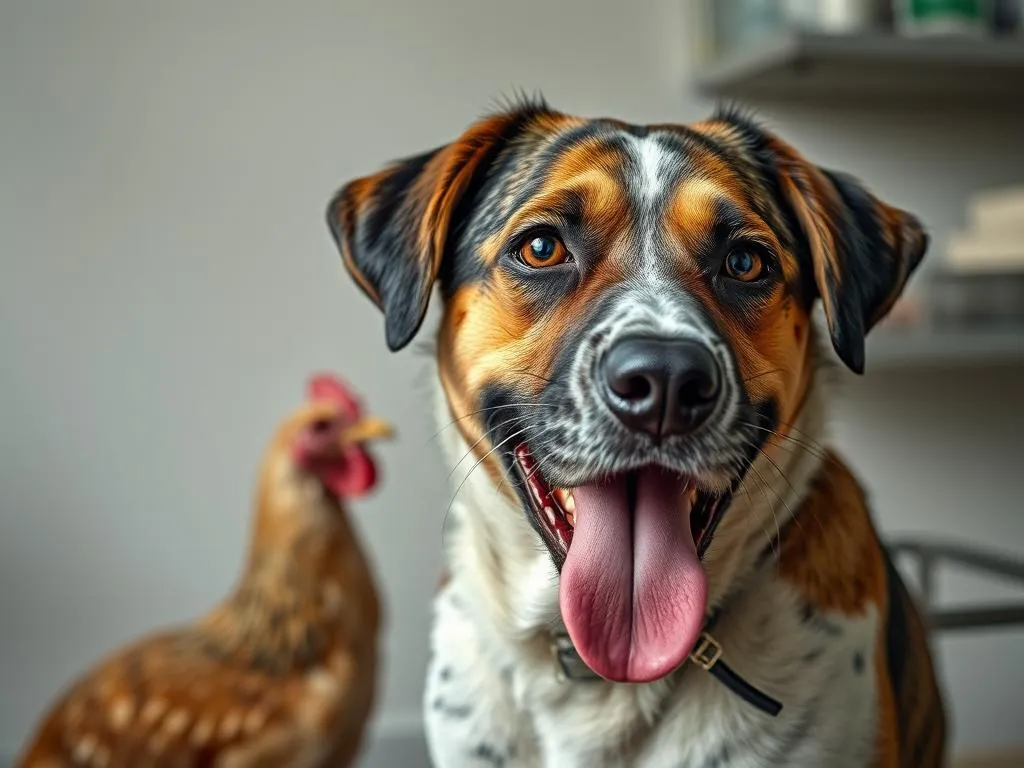
Introduction
Food allergies in dogs are a significant concern for pet owners, and understanding them is crucial for maintaining your dog’s health and well-being. One common question that arises is, can dogs be allergic to chicken? This article will explore this topic in depth, providing insights from veterinarians and information on how to identify and manage chicken allergies in dogs.
Understanding Food Allergies in Dogs
What Are Food Allergies?
Food allergies occur when a dog’s immune system mistakenly identifies a specific food ingredient as harmful. Unlike food intolerances, which do not involve the immune system and typically result in gastrointestinal distress, food allergies can trigger a more severe immune response. This response can manifest in various symptoms, making it essential for pet owners to differentiate between the two.
Common Symptoms of Food Allergies
Recognizing the symptoms of food allergies is vital for prompt treatment. Common signs include:
- Skin Issues: Dogs may experience itching, redness, or rashes, often leading to excessive scratching or licking.
- Gastrointestinal Problems: Symptoms like vomiting and diarrhea can indicate an allergic reaction to food.
- Behavioral Changes: Allergies can cause irritability or lethargy in dogs, impacting their overall mood and activity levels.
Chicken as a Common Ingredient in Dog Food
Nutritional Value of Chicken
Chicken is a widely used protein source in commercial dog foods due to its high nutritional value. It is lean, digestible, and packed with essential amino acids, making it a staple in many canine diets. However, this also raises concerns about potential allergies, especially since it is so prevalent.
Prevalence of Chicken Allergy
While many dogs thrive on chicken-based diets, statistics show that food allergies are increasingly common. Research suggests that chicken allergies affect a small percentage of dogs—estimates range from 10% to 30% of all food allergies, with beef and dairy being other common culprits. Compared to other protein sources such as lamb or fish, chicken remains a leading allergen for dogs.
Can Dogs Be Allergic to Chicken?
Vet Insights on Chicken Allergies
Veterinarians confirm that dogs can indeed be allergic to chicken. This misconception that chicken is a hypoallergenic option is misleading; while it is often recommended for dogs with food sensitivities, it can still trigger allergic reactions in some dogs. The likelihood of developing a chicken allergy can depend on various factors, including genetics and prior exposure.
Factors Contributing to Chicken Allergies
Several factors may contribute to a dog’s allergic reaction to chicken:
- Genetics and Breed Predisposition: Certain breeds are more prone to food allergies. Breeds like Labrador Retrievers, Cocker Spaniels, and Boxers may have higher incidences of allergies.
- Age and Exposure Factors: Younger dogs may develop allergies due to their developing immune systems, while older dogs might develop new allergies over time. Early exposure to a variety of proteins can either prevent or promote the likelihood of allergies.
Diagnosing Chicken Allergies in Dogs
Consultation with Your Veterinarian
If you suspect your dog has a chicken allergy, consulting with your veterinarian is essential. They will conduct a thorough assessment and ask questions about your dog’s diet, medical history, and symptom patterns.
Diagnostic Tests and Methods
To accurately diagnose chicken allergies, your veterinarian may recommend:
- Elimination Diet Trials: This method involves removing chicken and other common allergens from your dog’s diet for several weeks to see if symptoms improve.
- Skin Tests and Blood Tests: These tests can help identify specific allergens, but they are often less reliable for food allergies compared to elimination diets.
Treatment and Management of Chicken Allergies
Dietary Changes
One of the most effective ways to manage chicken allergies is through dietary modifications. Recommended options include:
- Hypoallergenic Diets: These diets are formulated with limited ingredients to reduce the risk of allergic reactions.
- Alternative Protein Sources: If your dog is allergic to chicken, consider proteins such as lamb, duck, or fish. These alternatives can provide essential nutrients without triggering an allergic response.
Symptomatic Treatments
In addition to dietary changes, symptomatic treatments may be necessary to alleviate the discomfort caused by food allergies. These can include:
- Medications: Corticosteroids or antihistamines may be prescribed to manage skin irritations and gastrointestinal symptoms.
- Supplements and Supportive Care: Omega-3 fatty acids and other supplements can support skin health and overall well-being, helping to reduce inflammation.
Long-term Management Strategies
Managing chicken allergies in dogs is an ongoing process. Regular vet check-ups are crucial for monitoring your dog’s health and adjusting dietary plans as needed. Additionally, stay vigilant for any new allergies that may develop, as dogs can become allergic to new proteins over time.
FAQs about Chicken Allergies in Dogs
Can chicken broth or chicken-flavored treats cause allergies?
Yes, chicken broth and chicken-flavored treats can contain chicken proteins that may trigger allergies in sensitive dogs. Always check the ingredient list and consult with your vet before introducing new treats.
How long does it take to see improvements after dietary changes?
Improvements can vary, but many pet owners notice a reduction in symptoms within 4 to 8 weeks of eliminating chicken from their dog’s diet. Continuous monitoring is essential during this period.
Are certain dog breeds more prone to chicken allergies?
Yes, specific breeds, including Labrador Retrievers, Cocker Spaniels, and some terriers, are more susceptible to food allergies, including chicken allergies. Genetic predispositions play a significant role in this susceptibility.
Conclusion
Understanding whether dogs can be allergic to chicken is vital for their health and longevity. Recognizing the symptoms, consulting with your veterinarian, and taking action with dietary changes and treatments can significantly improve your dog’s quality of life. Tailoring your dog’s diet to their unique needs is essential for preventing and managing allergies effectively. Always keep the lines of communication open with your vet to ensure your furry friend remains healthy and happy.









